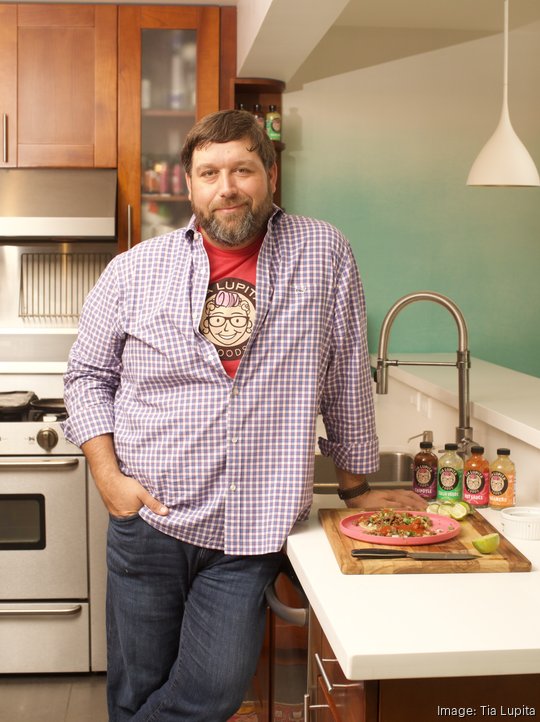
It all started with a hot sauce recipe.
Hector Saldívar would share the bottles of homemade hot sauce with friends and family his mother mailed to him from Monterrey, Mexico, where he grew up.
Unlike many store-bought brands, his mother's hot sauce mostly comprised chiles and wasn't thinned out with too much vinegar, packing it with flavor and generating fanfare.
So, after many years of working for other brands in the packaged foods industry like Diamond Foods, Nestle and Klass Time, Saldívar decided to start his own brand. In 2016, he founded Tía Lupita Hot Sauce, in honor of his mother.
"Tía Lupita is my mom. In Monterrey, it's a term of endearment. We don't usually refer to the parents of our friends like misses, ma'am, sir, mister. We call them tío, tía, aunt, uncle," Saldívar told me. "Tía Lupita is my mom, and she's your tía. It's my way of welcoming you to the family.
By 2018, the Tiburon-based company finally launched its first product: a hot sauce inspired by his mother's original recipe. The company now sells four flavors and has also expanded into low-carb and grain-free tortillas and chips made from nopal, a type of cactus frond known as prickly pear in English.
"The Mexican brands that were in the market, I would classify them as tired legacy brands of my parents or grandparents. They were not connecting with new generations of Hispanics," Saldívar said. "The new generations are like me. They are really close to their heritage and their culture, and are acculturating into the food trends here in the United States."
Nopal is native to the Americas and popular in Mexican cuisine and culture — an eagle sits atop nopal leaves on Mexico's flag.
Tía Lupita sources nopal from Nuevo León, Zacatecas and San Luis Potosí in Mexico and then turns it into a dehydrated, flour-like form as a base for its line of tortillas. They come in corn and grain-free options, the latter of which is also made with okara — reclaimed soy pulp that's left over from tofu and soy milk production — from Oakland-based Renewal Mill, adding to the sustainability of the products.
"It grows in the desert. It needs little to no water to grow, no maintenance. It reaches maturity every six months. We can crop and harvest twice a year. It was a no-brainer," Saldívar said.
The crop also supports struggling communities in Mexico, and by purchasing from those producers, Tía Lupita is "helping those communities in a very direct way survive," Saldívar said.
Tía Lupita has several manufacturing partners across North America. Its hot sauces are produced in Oakland and Colorado, the tortillas in Texas, the chips in Georgia and its newest product, a chili oil known as salsa macha, is made in Mexico.
Tía Lupita has raised around $1.9 million in equity funding, including around $86,000 from a Wefunder campaign last year. Its investors include Tompkins Square Ventures, Santatera Capital and Clover Vitality.
Saldívar also appeared in an episode of “Shark Tank” that aired in April and was offered an unusual deal from one of the investors.
"Our intention from the beginning was a straight investment for equity," Saldívar said, but he didn't want to give away too much of the company and had to pivot strategies when the so-called sharks weren't biting.
After a bit of negotiating, Kevin O'Leary agreed to give Saldívar a $500,000 line of credit at 12.5% interest in exchange for a non-dilutable 5% stake in Tía Lupita. The final terms are still being worked out, Saldívar told me.
In the meantime, Saldívar is currently raising a seed round and will be hiring for sales and marketing roles soon. The company has five employees, including Saldívar's wife, Amy, who helps out part-time.
Retail sales make up around 80% of their sales, Saldívar said, with the rest coming from direct online sales through channels like Shopify and Amazon. Their products are already sold in specialty grocers like Whole Foods, Mollie Stones and Sprouts. Walmart is rolling out soon, as well, and Saldívar expects to launch in Target by the end of the year.
"We're in the right place at the right time," Saldívar said.








